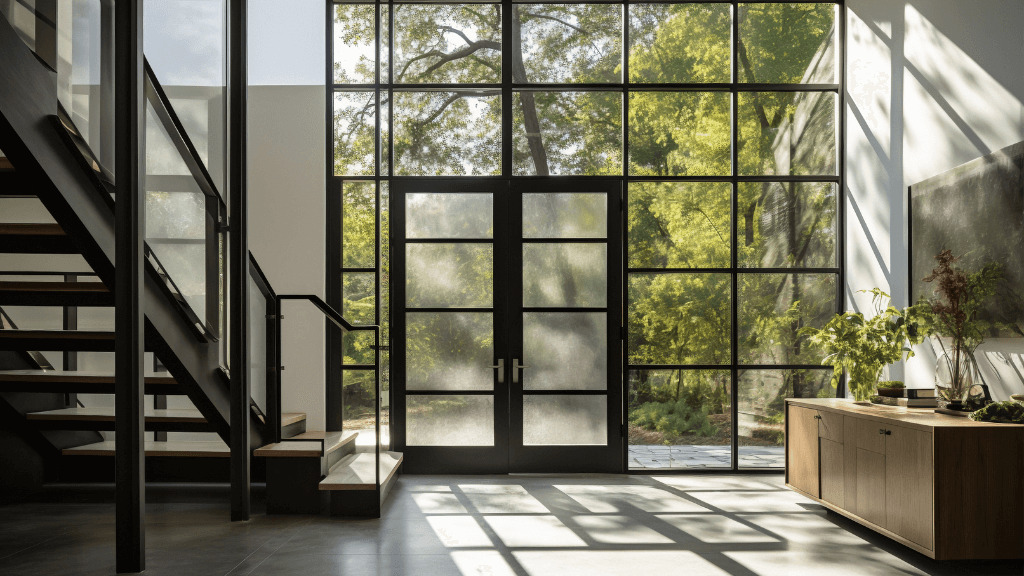Introduction
Glass partition doors have become a symbol of modernity and sophistication in interior design. Combining functionality with aesthetic appeal, they create a seamless way to separate spaces while allowing light to pass through. In this blog, we delve into the world of glass partition doors, exploring their different types, the benefits they offer and their diverse applications in both residential and commercial spaces.
Types of glass partitions doors
1. Frameless Glass Doors: Frameless glass doors are sleek and minimalist, with glass panels that are seamlessly joined without visible frames or supports. They create a feeling of openness and offer an unobstructed view. These doors can be revolving or sliding.
2. Framed Glass Doors: Framed glass doors, as the name suggests, have visible frames that provide additional support and structure. They are ideal for applications where greater strength or design flexibility is required.
3. Sliding Glass Doors: Sliding glass doors are a space-saving option. They consist of two or more glass panels that slide horizontally along a track. They are perfect for creating a connection between indoor and outdoor spaces or for dividing large areas.
4. Hinged Glass Doors: Hinged glass doors work much like traditional doors. They are attached to the frame and pivot on hinges, providing a more secure seal. Hinged glass doors are commonly used in entryways or between interior rooms.
5. Frosted glass doors: Frosted glass doors have a translucent, textured surface that obscures the view while allowing light to pass through. They offer privacy without sacrificing lighting and are often used in bathrooms, bedrooms or office spaces.
Advantages of glass partitions doors:
1. Light enhancement: Glass partition doors allow natural light to flow through the space, reducing the need for artificial lighting and creating a bright and welcoming atmosphere.
2. Openness: They maintain an open and spacious environment, making the spaces more expansive and connected.
3. Visual appeal: Glass doors add a touch of elegance and modernity to any space. Their clean lines and transparency complement various design styles.
4. Privacy with transparency: Glass doors provide a degree of privacy while maintaining a sense of connectedness between spaces. The option of frosted or tinted glass offers more privacy.
5. Easy maintenance: Glass partition doors are relatively easy to clean. They can be clean with common glass cleaners and require minimal maintenance.
6. Durability: Glass partition doors are usually made of tempered glass, which is stronger and more resistant to breakage than ordinary glass.
Applications of glass partition doors:
1. Office spaces: Glass partition doors are commonly used in offices to create private offices, meeting rooms, or collaborative workspaces. They promote a sense of privacy while maintaining an open office layout.
2. Living spaces: In homes, glass partition doors can be used to separate living spaces such as kitchens and dining rooms, or to create elegant shower cubicles.
3. Commercial facilities: Glass doors are ideal for retail stores, restaurants and hotels. They can used to create welcoming entrances, private dining rooms or dressing rooms.
4. Educational institutions: Glass partition doors are used in schools and universities to divide classrooms, offices or study areas and provide an open but defined learning environment.
5. Healthcare facilities: In healthcare facilities, glass partition doors create discreet areas for patients or add privacy to waiting rooms and reception areas.
Considerations for glass partitions doors:
1. Price: The cost of glass partition doors can vary depending on the type of glass, design and possible customization. It is essential to align the budget with the objectives of the proposal.
2. Privacy Needs: Consider the level of privacy required for your particular application. Different types of glass and coating options offer different degrees of privacy.
3. Regulatory compliance: Check local building codes and regulations to ensure your glass partition door meets safety standards and norms. Some applications may require a security film or other security measures.
4. Customization: Glass partition doors can be customized in a variety of ways. Consider factors such as size, thickness and any other features such as matting or tinting.
Read more on A Guide to Glass Partition Walls: Installation, Benefits, and More
Conclusion
Glass partitions doors represent a combination of functionality and aesthetics, making them a valuable addition to interior spaces. Their ability to allow light to pass through, maintain an open feel and offer privacy with transparency makes them an ideal choice for a variety of applications.
By understanding the different types, benefits and considerations associated with glass partition doors, you can make an informed decision about how to incorporate them into your space.


